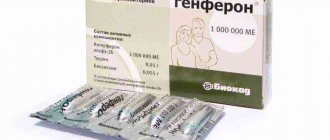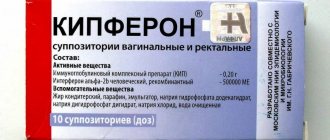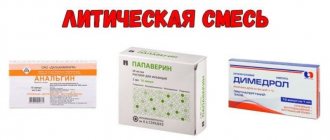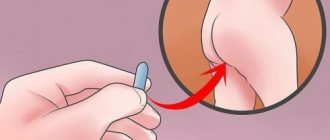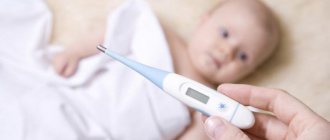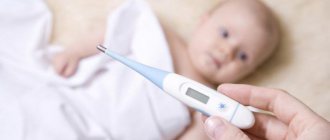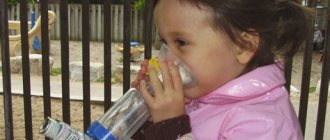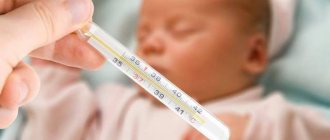At fever, the body produces interferons - substances that naturally stimulate the immune system to fight infection.
Hexoral for children. At what age can it be given to children?
You can find a list of things for newborns here.
Which wheelchair to choose for a child: https://ru-mama.net/vospitanie/igrushki/mashinka-katalka-dlya-detej.html
Recommendations
If a child’s illness goes away with an increase in body temperature, this means that the immune system is reacting to the infection and bacteria that cause it.
The child's body fights pathogenic microbes on its own.
As a result, the development and reproduction of bacteria stops.
If the baby has a strong immune system, then the body can independently fight the virus by producing a special substance - interferon.
It is recommended to reduce the temperature in children under one year of age when the thermometer rises above 38.2 degrees, in older children - when the temperature is above 38.5.
respond immediately if you experience chills or convulsions as your temperature rises.
It's comfortable!
Antipyretics are medications that are used to lower the temperature in children with colds and viral diseases. Taking these medications should not be permanent, since the purpose of their use is a one-time reduction in temperature.
It should be noted that in the case of treating a child with antibacterial agents, it is difficult to assess the effectiveness of the effects on the body of drugs whose action is aimed at reducing fever.
Antipyretic drugs are available in the form of tablets, injections, syrups and rectal suppositories.
When choosing the form of the medicine, you should also remember that tablets and syrups act 20 minutes after taking them. The suppositories begin to act on average 40 minutes after use, but the reduction in the child’s temperature will take longer.
Children's suppositories for fever are the most convenient form of medicine. Children of any age hate tablets - they are so unpleasant to chew and swallow!
When using syrup in infants, you may encounter the problem of regurgitation , since the baby simply does not know how to swallow anything other than breast milk.
In cases where an increase in temperature occurs due to a disease that is accompanied by nausea and/or vomiting, the use of tablets and syrups is not advisable . Temperature suppositories are indispensable if you need to use an antipyretic when the child is sleeping.
Another advantage of suppositories is that, when administered into the rectum, medicinal substances are released faster, absorbed into the blood and immediately begin to act, whereas tablets and syrups first enter the stomach.
Then into the esophagus, pass through the liver and are partially destroyed under the influence of digestive enzymes.
Painkillers for children: tablets, remedies, analgesics
Currently, the pharmaceutical industry is growing very quickly and can offer a wide range of drugs. One of the most common and popular groups are analgesics.
However, even with this level of development of pharmacy, the number of painkillers used in pediatric practice can be counted on one hand.
This problem is associated with the incomplete development of the child’s body, its increased sensitivity and instability.
Indications for the use of painkillers for children
The child's body is very sensitive to pain and cannot endure it for a long time; this fact gives rise to the need for urgent relief of pain. Indications for the use of painkillers in children are:
- infectious diseases accompanied by pain, most often respiratory tract infections that occur with severe intoxication (influenza, ARVI, etc.),
- toothache during teething,
- injuries,
- chronic diseases accompanied by pain,
- headache.
The range of indications for prescribing analgesics in childhood is quite wide. Parents often self-medicate, giving medications to their child whenever they complain of pain.
This approach is fundamentally wrong, since pain can be a manifestation of some serious or dangerous disease, and suppression of such a serious symptom as pain significantly complicates and delays diagnosis.
What medications are suitable for children
As mentioned earlier, there are not many such drugs, so all mothers know them by heart, along with their contraindications and side effects. Such drugs include:
- paracetamol,
- ibuprofen,
- nimesulide.
Like any other medicinal substances, they have their pros and cons.
Paracetamol, at a dose of 10 mg/kg body weight (not more than 60 mg/kg per day). Children under one year of age are prescribed in the form of rectal suppositories, from one to 12 years of age in the form of suspensions and syrups, and older children can be given tablets (no more than 4 per day). In addition, paracetamol has an anti-inflammatory and antipyretic effect, the analgesic effect develops after 20 minutes and lasts 4-6 hours.
Ibuprofen, dose 5-10 mg/kg (no more than 30 mg/kg per day). The effects are similar to paracetamol, but the analgesic effect is shorter (1-2 hours). For children under 12 years of age in the form of suspensions, after that in the form of tablets (no more than 4 per day).
Nimesulide, dose 1.5 mg/kg. The effect develops after 30 minutes and lasts for 12 hours. This drug is used for severe forms of pain (injuries, fractures).
Safe painkillers for children
To use a medicinal product in pediatric practice, it must meet strict requirements:
- available in various dosage forms, for ease of use in children of different ages,
- minimal number of side effects,
- rapid development of medicinal action,
- low concentration to develop the effect,
- do not accumulate in the body,
- metabolized without the formation of toxic products,
- rapid elimination from the body,
- long-term maintenance of the effect,
- do not cause allergic reactions,
- wide availability and reasonable price.
Such stringent requirements explain the limited choice of drugs.
Pain reliever for infants
People try not to prescribe painkillers in infancy, but if necessary, this should be done in a hospital setting under the strict supervision of a doctor. For newborns, you can use paracetamol and ibuprofen in the form of rectal suppositories.
Contraindications to the use of analgesics
Analgesics in childhood are prescribed according to strict indications, but there are conditions in which their use is also strictly contraindicated. These conditions include:
- headaches after head injury or unknown etiology,
- acute pain in the abdomen,
- ear discharge,
- individual intolerance to the drug,
- unreasonable use (for minor pain),
- exceeding the daily dose.
Elimination of pain in some surgical and neurological pathologies can hide the most striking symptoms and lead to diagnostic error.
In addition to these conditions, there are medications that are absolutely contraindicated for use in pediatric practice. These include:
- aspirin,
- citramon,
- undipl.
These drugs can cause serious complications in children. Therefore, they are shown only after 12 years.
The child's body is too fragile and unstable. Therefore, the prescription of any drugs must be strictly justified and approved by a doctor. If any adverse or allergic reactions occur, you must discard this drug and replace it with another.
Loading…
Source: https://prof-medstail.ru/zdorove-rebenka/obezbolivayushhie-dlya-detej
Terms of use
When using medications in the form of suppositories, you should adhere to the following instructions :
- place the patient on his left side; his legs should be bent at the knees and pressed to his stomach ;
- spread your buttocks and lubricate the anus area with baby cream or Vaseline oil ;
- insert the candle into the anus with the narrow end; You can first moisten the candle with warm water so that its surface becomes slippery;
- after administering the suppository, the patient needs to lie down for 10 minutes .
Important : suppositories can cause stool in the child. Therefore, to avoid repeated administration of the medicine, it is recommended to do a cleansing enema before using the suppository.
Caution : if after administering the suppository the child experiences itching and pain in the rectum, you should stop using the medicine and consult a doctor.
Kogitum for children. How to take it for children and in what dosage.
If your newborn has hiccups, do this.
ACC in syrup or tablets: https://ru-mama.net/zdorovie/detskie-lekarstva/acc-dlya-detej.html
Contraindications to the use of painkillers
There are situations in which the use of analgesics is not recommended. First of all, we are talking about severe abdominal pain, especially accompanied by nausea and vomiting. Such pain may indicate the development of appendicitis or another serious disease that requires urgent assistance from a surgeon. The use of painkillers in such a situation blurs the clinical picture and significantly complicates the diagnosis. Delay in case of appendicitis can cause serious complications, including death.
Advice
Does your child have abdominal pain, vomiting, or bloody stools? Call an ambulance immediately!
You should not give your child pain medications for headaches that are accompanied by confusion, drowsiness, and delirium. Such signs can occur with encephalitis - damage to brain tissue. Taking analgesics in this situation will only worsen the child’s condition. If such symptoms appear, you should immediately consult a doctor.
Tsefekon suppositories
Modern fever medicines for children are based on paracetamol or ibuprofen.
These are substances that have anti-inflammatory, analgesic and antipyretic effects.
Paracetamol and ibuprofen are effective and well tolerated in children, unlike aspirin.
The drug Cefekon-D, which is available in three versions : one suppository contains different amounts of paracetamol depending on the age and weight of the child.
Cefekon-D 50 mg is a suppository for fever for newborns from 1 to 3 months . Cefekon-D 100 mg is suitable for children from 3 months to 3 years , and Cefekon-D containing 250 mg. paracetamol – from 3 to 12 years .
Each package contains 10 suppositories, individually packaged in PVC film.
The paracetamol-based painkiller does not irritate the gastrointestinal mucosa and is well tolerated by children of any age.
Paracetamol is well absorbed and processed by the liver and excreted in the urine. The maximum concentration of the substance in the blood is achieved within 30-60 minutes .
Indications for use
Tsefekon suppositories can be used to reduce temperature during influenza and acute respiratory viral infections, headaches, toothaches, muscle pain, painful injuries and burns.
Fever suppositories for newborns from 1 to 3 months are usually used once if the baby has a fever after vaccination.
Dosage
A single dose of Cefekon is 10-15 mg. Active substance per 1 kg. child's body weight.
For a child weighing 4-6 kg . One 50 mg suppository is administered.
For a child weighing 7-10 kg . One 100 mg suppository is administered.
For a child weighing 11-16 kg . One or two 100 mg suppositories are administered.
For a child weighing 17-30 kg . 1 suppository of 250 mg is administered.
A child weighing 31-35 kg is given 2 suppositories of 250 mg each.
The maximum dose of the drug should not exceed 60 mg. paracetamol per 1 kg. child's body weight in one day.
Is it possible to give valerian to children?
There is a lot of information here on how to choose the right mattress for a child.
Encopresis. Treatment with folk remedies: https://ru-mama.net/zdorovie/detskie-bolezni/enkoprez-u-detej.html
Cefekon suppositories for fever will begin to act 30-40 minutes after administration. The break between doses should be at least 4-6 hours .
Cefekon should be used as an antipyretic for no more than 3 days, and for pain relief - no more than 7 days .
If the symptoms of the disease do not go away, it is better to consult your pediatrician. Long-term use of the drug in large doses is toxic !
When using Cefekon in children, side effects rarely occur, which include disorders of the digestive tract and allergic reactions. If a child has liver and kidney diseases, Cefekon suppositories should be used with great caution .
List of the best painkillers and anti-inflammatory suppositories
The main pain syndrome that develops with inflammation of the mucous membrane or denser intestinal tissue is the so-called colitis. This symptom is characterized by an acute course or aching pain, which manifests itself periodically under the influence of negative factors (poor nutrition, long intervals between meals, dysbacteriosis, bacterial or viral infection entering the gastrointestinal tract).
Anti-inflammatory suppositories contain antibiotics of one group or another, which are indicated for use in cases of bacterial invasion, when the inflammatory process in the intestinal cavity is associated with an imbalance of bacterial microflora towards pathogenic microorganisms.
Pain-relieving suppositories are necessary in order to quickly and effectively eliminate the very symptoms of pain. They perfectly relieve spasms, colic, cutting and aching pain.
In addition, anti-inflammatory suppositories have a smaller list of contraindications and side properties, which has a more beneficial effect on the digestive tract system. There is no chemical load on the liver tissue, and the gastric mucosa and pancreas do not suffer, as is usually the case during long-term use of tablet medications.
Below is a list and pharmacological characteristics of the most effective rectal suppositories with an anti-inflammatory and anesthetic spectrum of action.
Hexicon
This drug contains the active substance - chlorhexidine bigluconate. It is considered an excellent antiseptic, which is taken 1 suppository per day. It is advisable to insert the suppository into the rectal cavity at the same time. It is recommended to do this in the morning. The duration of treatment is from 7 to 10 days. It is used to combat a pathogenic infection that has penetrated the organs of the gastrointestinal tract and affected their mucous membrane, provoking a sluggish or acute inflammatory process.
The principle of action of the drug is that chlorhexidine molecules, together with the flow of the bloodstream, enter the site of the disease, are embedded inside the cell of the bacterial agent and destroy it from the inside, blocking the flow of oxygen into it. In this regard, the activity of pathogenic microflora quickly decreases, and the population of infectious agents gradually decreases to a minimum. In parallel with this, the cells of the immune system also fulfill their functional role and contribute to the accelerated cleansing of the intestines from inflammatory foci. The cost of one package of this medicine is 450 rubles.
Polygynax
The drug consists of a combined pharmacological formula, since it simultaneously contains such active components as neomycin, group B polymyxin, nystatin (an anesthetic). The optimal course of treatment is 10 - 14 days. 1 suppository is inserted into the anus in the morning and evening. The main thing is that there is a time interval of at least 12 hours between doses of the medication. This drug belongs to the aminoside antibiotic series.
Relieves inflammation of the intestinal mucosa and at the same time destroys the infection so that there is no relapse of the disease.
In retail pharmacy chains, the price of Polygynax anti-inflammatory suppositories is in the range of 280-300 rubles per package.
Meratin-combi
It has a similar composition as Polygynax suppositories, but in this case a powerful antiseptic is also added - prednisolone. The drug simultaneously eliminates the most acute pain syndrome and at that moment stops the focus of pathological inflammation. It does not matter what caused the disease and what its nature of origin is. Taken no more often than 1 time per day. The average duration of one course of treatment is 10 days.
In particularly difficult cases, it can be extended if the attending physician considers it appropriate to use this medication for a longer period. The cost of painkillers and anti-inflammatory suppositories Meratin-combi is 370 rubles per pack, which contains 10 suppositories. With positive dynamics of recovery, 1 package is enough to complete a full course of intestinal therapy.
Mikozhinaks
A complex remedy for systemic therapy of inflammatory diseases of the gastrointestinal tract and genitourinary system. Designed to relieve aching and acute pain, relieve swelling of the mucous membrane, suppress the growth of bacterial and fungal infections, which is especially important if the patient has developed colitis due to dysbiosis and the appearance of intestinal mycosis. The active components of the rectal suppository are chloramphenicol and metronidazole. The latter type of antiseptic is capable of fighting gram-positive, gram-negative microorganisms, as well as bacteria leading a parasitic and intracellular lifestyle.
Dexamethasone acts as an analgesic. It is believed that the optimal duration of one therapeutic course is 10 days. It is injected into the rectal cavity 1 or 2 times a day, depending on the severity of the current disease. It has a minimal number of medical contraindications and negative side effects. One package of Mikozhinax suppositories will cost the buyer 350-360 rubles.
Betadine
Anti-inflammatory and analgesic rectal suppositories that provide an antiseptic effect due to iodine-based compounds. It is also produced by pharmacological companies in other forms of release (antiseptic solution). The course of treatment is longer than that of suppositories with a similar spectrum of action and lasts at least 12 days. The average dosage of the drug for an adult is 1-2 suppositories in the morning and evening.
It is considered a universal anti-inflammatory and analgesic intended for intestinal therapy. In practice, it has proven its effectiveness against bacterial, viral and fungal infections that parasitize the organs of the digestive system. Well absorbed by the body of patients of all age groups .
The only disadvantage of the drug is that it is contraindicated in patients with thyroid dysfunction, the tissues of which produce a larger volume of hormones than is necessary for the normal functioning of the body.
All of the above drugs are truly among the best in their category and help not only to relieve pain from intestinal colitis, but also help get rid of a large number of gastrointestinal diseases, the nature of which is closely related to infection entering the body. Despite the fact that the specified list of rectal suppositories has a beneficial effect on the human intestines, only a gastroenterologist or proctologist who is treating the patient can prescribe their use. The selection of medication, its dosage and duration of administration are carried out.
Self-treatment is contraindicated and can cause much more serious complications.
Viferon candles
For colds, doctors often prescribe Viferon suppositories for children.
But Viferon suppositories for fever should only be used in combination with another antipyretic agent.
The basis of Viferon is human recombinant interferon alpha-2, which does not have an antipyretic effect.
But it is a powerful immunostimulating and antiviral agent, therefore it is widely used in the treatment of viral diseases.
Interferon in combination with ascorbic acid and tocopherol acetate stimulates the natural immune system to fight the virus and prevents the formation and spread of viral particles.
Lytic mixture for children.
If your child has rashes on his face, then you need advice from experienced mothers.
Cogitum. Instructions for children: https://ru-mama.net/zdorovie/detskie-lekarstva/kogitum-dlya-detej.html
When interferon is administered rectally, there are practically no .
Viferon is used in the complex treatment of influenza, ARVI, as well as chronic viral hepatitis B, C and D in children and adults.
Application and dosage
The drug "Viferon" is approved for use in newborns from the first days of life, as well as in premature infants.
Children under 7 years of age are prescribed Viferon-1, children over 7 years of age are prescribed Viferon-2.
The number of suppositories in one package (10) is designed for one course.
Viferon is prescribed 1 suppository 2 times a day every 12 hours. The number of courses depends on the disease and is determined by the doctor.
Contraindications for use
Suppositories as an antipyretic are a very effective drug, since when used, the medicine directly enters the bloodstream without irritating the mucous membrane of the stomach and intestines. However, like other medications, these medications have contraindications for use.
When using suppositories to reduce fever in children, do not exceed the recommended dosage . The child can also be harmed if the drug is used for a long time. When using medications, you must strictly follow the instructions for them.
All this is necessary to ensure safe treatment of the child. Long-term use of antipyretic suppositories in rare cases leads to intestinal irritation . In addition, a side effect if the dosage is exceeded may be impaired functioning of the kidneys and liver. Allergic reactions and circulatory problems may occur
The age of the child is also a contraindication to the use of some types of these medications . Therefore, it is very important to pay attention to the contents of the instructions for a particular medication.
Fever in children does not always need to be brought down .
The presence of fever in a child with a cold or viral infection indicates that the child’s body is fighting the disease.
The use of medications that relieve fever does not help treat the disease .
They only reduce the child’s high body temperature for a certain time, thereby making the baby feel better. Up to 38.5 degrees, there is no need to give the child special medications.
If after taking antipyretic medications the temperature has decreased, it is recommended to take the drug again only if the child has a fever again. However, there are a number of cases in which a child’s temperature needs to be brought down already at 38 degrees :
- the child has diseases of the nervous system ;
- if the child has previously had low-grade seizures ;
- baby is less than three months ;
- severe cardiovascular diseases.
If a child has a fever, it is recommended not to self-medicate , but to call a specialist for examination. Treatment of children should be under the supervision of a pediatrician, since in some cases even the most harmless drugs can cause serious complications .
aspirin before the age of 3 are much more susceptible to developing bronchial asthma by the age of six.
For infants
Newborn children are also susceptible to viral and colds, which are associated with increased body temperature.
The most effective way to reduce fever in infants are special candles for children of this age.
The child’s temperature needs to be lowered only if it exceeds 38 degrees. For this purpose, to improve the well-being of newborns, experts recommend using medications in the form of suppositories.
The safest medications for infants are medications containing paracetamol . Many candles for babies are developed based on this substance. ibuprofen- based medications to your child .
Only a pediatrician should prescribe treatment for an infant . It is the specialist who will make a diagnosis in each specific case and determine which drug is most effective in improving the baby’s well-being.
Popular painkillers for children of different ages
Painkillers based on paracetamol, ibuprofen and nimesulide are approved for use in pediatrics. The dosage form depends on the age of the child:
READ ALSO: how to give Paracetamol syrup for children?
- Newborn babies are given suppositories - rectal suppositories. They act quickly, effectively and a little longer in time than other forms of the drug.
- Children from six months old can be given products in syrup or suspension; they can already swallow them well, and flavoring additives will add to their attractiveness.
- From older preschool age, drugs in tablets, powders and capsules are used.
What are the popular painkillers for children and how to take them?
Syrup and suspension Panadol, Efferalgan is used in the treatment of children over 1 year of age, the dose is calculated depending on weight:
| Child's body weight | Dosage per appointment |
| 4-8 kg | 2.5 ml |
| 8-16 kg | 5 ml |
| 16-32 kg | 10 ml |
| More than 32 kg | 15-20 ml |
For babies under one year old, pediatricians recommend using suppositories: Efferalgan, Tsefekon, Panadol (we recommend reading: instructions for using Tsefekon suppositories for children). The dosage is calculated depending on body weight - 10 mg/kg.
READ ALSO: dosage for children's "Panadol" for a child
Paracetamol
Reduces temperature, inflammation and pain relief. Children are allowed to use from three months in the form of suppositories; syrup can also be used. Frequency of application up to 4 times a day, every 4-6 hours. Paracetamol tablets are approved for use from 2 years of age; for children it is better to crush it and give it with water: (more details in the article: at what age can a child be given the drug “Paracetamol” in tablets?)
| Child's age | Dosage per appointment |
| From 2 to 6 years | 0.5 tab. 200 mg |
| 6-10 years | 1 table 200 mg |
| 10-12 years | 1 table 325 mg |
| Over 12 years old | 1-3 tables 325 mg |
Ibuprofen
Has the same effect as Paracetamol. The most popular drug based on this substance is Nurofen:
- Nurofen suppositories are used for children from three to nine months, 60 mg per dose 3 times a day, from 9 months to 2 years - 4 times a day;
- Nurofen syrup is approved for use in children from three months at a dosage of 5-10 mg per 1 kg of body weight, maximum daily dose 30 mg/kg;
- Nurofen tablets are taken from the age of 12, 1 tablet 4 times a day.
Nimesulide
A very strong remedy that is used when Paracetamol and Ibuprofen do not help cope with pain or fever. Based on it, the drugs Nise and Nimesil are produced:
READ ALSO: instructions for using children's "Ibuprofen" tablets
- Nise syrup is approved for use in children over 2 years of age at a dosage of 1.5 to 3 mg per 1 kg of weight;
- Nise tablets are taken from the age of 12 at a dose of 3 mg/kg.
Efferalgan
Efferalgan suppositories, first of all, have an antipyretic effect on the child’s body. Doctors also prescribe them for symptoms of dental, headache, and muscle pain in children. The drug Efferalgan is an effective remedy for reducing fever in a child with infectious, viral diseases, as well as colds.
Dosage
Efferalgan suppositories are available in dosages depending on the age of the children :
- for children aged from one month to five - 80 mg ;
- from six months to one and a half years, the dosage is 150 mg ;
- For children from four to 10 years old, suppositories are available in a dosage of 300 mg .
The maximum dose of medication for a child per day is calculated depending on body weight. As a rule, 60 mg of the drug is calculated per 1 kg of child weight. It is recommended to use Efferalgan suppositories at intervals of 6 hours .
If, after three days from taking the drug, the child continues to have a fever, you should consult a doctor . If the child is less than two months old, then he is usually prescribed no more than one Efferalgan suppository per day.
The effect of the drug is observed two hours after its use.
Side effects
Efferalgan suppositories are well tolerated by children. Very rarely, a child may have an allergic reaction.
If the specified dose is exceeded, nausea, vomiting, and abdominal pain may occur. If such symptoms occur, you should immediately consult a specialist and stop using this drug.
One of the advantages of these suppositories is the possibility of their use even in children weighing 4 kg and above. The drug works for a long time. It is also recommended to quickly reduce fever by combining a combination of syrup and antipyretic suppositories.
Painkillers for children for all types of pain
When the baby is very small, it is very difficult for him to cope with pain, and “adult” drugs are contraindicated. Therefore, there are special children's medicines for toothache, earache, as well as abdominal pain and fractures. Let's look at the most well-known and effective painkillers for children.
Painkillers for children with toothache
Depending on the age of the baby, almost every family faces the acute question of what to give a one-year-old child when teething and what to give to an older child for caries. This is one of the most insidious types of pain, causing a lot of suffering to both the child and the parents.
Painkillers for teething
If your baby has profuse salivation, a high temperature, his gums are red and enlarged, and he cannot sleep or eat, this means that he is very worried about discomfort from teething.
This is the most stressful period in a baby’s life, so it is important to prepare medications in advance - pain can begin unexpectedly at night. Before doing this, you need to consult your local pediatrician about the appropriateness of this or that remedy.
Here are the most effective painkillers for teething in a six-month-old baby:
- Cooling anesthetic gel for children: Kalgel, Pansoral, Kamistad, Dentinox, etc., they cool the gums, relieve itching and inflammation, and alleviate the painful eruption of baby teeth.
- Drops, syrups, as well as tablets or suppositories: Dantinorm, Dentokind, Panadol, Vibrukol, Nurofen, which, thanks to ibuprofen, paracetamol and herbs in the composition, reduce fever and pain.
Each of these drugs has an individual dosage, which is further specified by the doctor.
How to relieve pain if a child has a toothache
If a preschooler or schoolchild has developed caries and other dental diseases, before visiting the dentist, the mother will need something to reduce severe pain. You can effectively numb a child’s tooth at home for 2-3 hours or overnight if you have the appropriate medications at the ready:
- from 3 months: Paracetamol in a convenient form - in suppositories or tablets, in the form of syrup;
- from 2 years: Nimesulide, which allows you to relieve the baby from pain for half a day;
- from 12 years of age: analgin in tablets (injection solution or suppository is allowed from 6 months).
When a child has a toothache, what the mother chooses to numb the pain with is based on the time of day. If it is at night, then it is better to give the baby Nimesulide so that he can go for treatment in the morning. And on a weekday day you can give a short-acting drug.
How to relieve a child's ear pain
If a child has a shooting or cutting in the ear, it is highly likely that it is otitis media, an inflammatory disease. Typically, pain occurs in the evening and at night, when it is difficult to get help from a pediatrician. Then mom can do the following:
- drop a painkiller into the child's ear - Otipax drops, and after 10 minutes the baby will stop crying;
- give Ibuprofen in any form - rectal suppositories, syrup, tablets;
- Combine drops with Ibuprofen for high intensity pain.
It is important to remember that both painkillers and antipyretic drugs have the greatest effect for children. In addition to Ibuprofen, these include Paracetamol, but the child must have a doctor’s permission to take it.
What painkillers can children have for fractures?
Strong medications for children with fractures are simply necessary - the baby is simply unable to endure such acute pain. In this condition, it is important to choose the right form of the drug, because children under 8 years of age find it difficult to swallow tablets - rectal suppositories, syrups, and water-soluble powders are better suited for them.
Painkillers for children with pain from a fracture may be different, but they should contain one of the following substances.
- Analgin - only if there is nothing else, since this painkiller is not recommended for children, especially since it begins to act only after 20 minutes.
- Ibuprofen is effective against pain and inflammation, but should not be taken on an empty stomach. Available in Ibufen, Nurofen, Bolinet, Miga-200.
- Paracetamol is a strong analgesic contained in the drugs Efferalgan, Calpol, Volpan, Adol, Panadol, Aminadol.
- Nimesulide - in addition to pain relief, protects cartilage from destruction and has no side effects. Contained in the preparations Nimesil, Nimulid, Nise.
How to relieve a child's abdominal pain
Since the mother cannot determine the exact cause of the pain, it is usually difficult to relieve the child’s stomach pain on her own. The cause may be indigestion, intestinal cramps or gastritis - for these conditions, various drugs are prescribed, which, if used incorrectly, can be harmful.
If the baby’s gastrointestinal tract has always been normal, and he ate with dirty hands or ate something stale, then you can give Smecta or activated charcoal.
But, in any case, if acute pain continues, you need to call an ambulance - the digestive tract is not to be trifled with. Dr. Komarovsky’s advice will help you navigate issues of abdominal pain in more detail:
Now you know what painkiller to give your child in this or that case. But remember that getting rid of pain does not cure the disease - this should be addressed by a doctor as soon as possible.
Source: https://bezsoski.ru/obezbolivayushhie-preparaty-dlya-detej-ot-vsex-vidov-boli/
Genferon
Genferon suppositories are a combination drug that is prescribed to children for viral diseases . In addition, this medicine stimulates the child's immune system, thereby promoting his speedy recovery.
Genferon suppositories help very well in the treatment of colds, viral diseases, and flu.
The properties of the drug are explained by the presence of human interferon in its composition, which increases the child’s immunity and body resistance.
This medicine has gained popularity and distribution when used to treat children. Genferon suppositories are characterized by antiviral as well as immunomodulatory properties. When prescribing complex treatment, these medications are perfectly combined with other medications.
And if a child takes antibiotics, the medicine has a positive effect on the intestinal microflora, preventing the development of dysbiosis. It is recommended to combine the use of Genferon suppositories with children taking vitamins A and C.
Dosage
This drug should be prescribed by a doctor , indicating the dosage depending on the age and body weight of the child. For children under 7 years of , the medicine is available in a smaller dosage.
For infectious and inflammatory diseases in children, two suppositories are usually prescribed per day for five days. But only a pediatrician should prescribe a specific treatment period and recommended dose.
Side effects
Basically, the drug does not cause side effects in children. , the body may to Genferon suppositories such as dizziness, allergies, sweating, and loss of appetite. After discontinuation of the drug, these symptoms disappear.
